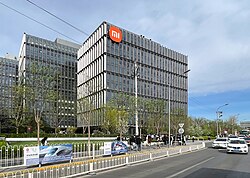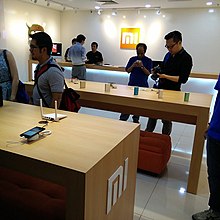
Back شاومي Arabic شاومى ARZ Xiaomi AST Xiaomi Azerbaijani شیائومی AZB Xiaomi Bashkir Xiaomi Byelorussian Сяоми Bulgarian शाओमी Bihari শাওমি Bengali/Bangla
 | |
 Headquarters in Haidian District, Beijing | |
| Xiaomi | |
Native name | 小米集团 |
Romanized name | Xiǎomǐ |
| Company type | Public |
| |
| Industry | |
| Founded | 6 April 2010 |
| Founder | Lei Jun Lin Bin |
| Headquarters | Haidian District, Beijing, China |
Area served | Worldwide |
Key people | |
| Products | |
| Brands | |
| Revenue | (2022)[1] |
| Total assets | |
| Total equity | |
Number of employees | 32,543 (31 December 2022)[1] |
| Subsidiaries |
|
| Website | www |
| Xiaomi | |||||||||
|---|---|---|---|---|---|---|---|---|---|
 "Xiaomi" in Chinese characters | |||||||||
| Chinese | 小米 | ||||||||
| Literal meaning | Millet | ||||||||
| |||||||||


Xiaomi Corporation (/ˈʃaʊmi/;[2] Chinese: 小米), commonly known as Xiaomi and registered as Xiaomi Inc., is a Chinese designer and manufacturer of consumer electronics and related software, home appliances, automobiles and household hardware. It is the second-largest manufacturer of smartphones in the world, behind Samsung,[3] most of which run on the MIUI (now HyperOS) operating system, which is based on the Android operating system. The company is ranked 338th and is the youngest company on the Fortune Global 500.[4][5]
Xiaomi was founded in 2010 in Beijing by Lei Jun along with six associates. Lei had founded Kingsoft as well as Joyo.com, the latter of which he sold to Amazon for $75 million in 2004. In August 2011, Xiaomi released its first smartphone and, by 2014, it had the largest market share of smartphones sold in China. Initially the company only sold its products online; however, it later opened brick and mortar stores.[6] By 2015, it was developing a wide range of consumer electronics.[7] In 2020, the company sold 149.4 million smartphones and its MIUI (now HyperOS) mobile operating system has over 500 million monthly active users.[8] As of 2023, Xiaomi is the third-largest seller of smartphones worldwide, with a market share of about 12%, according to Counterpoint.[9] Its presence led some people to call Xiaomi the "Apple of China".[10] It has come up with its own range of wearable items.[11] It also is a major manufacturer of appliances including televisions, flashlights, unmanned aerial vehicles, and air purifiers using its Internet of things and Xiaomi Smart Home product ecosystems.
Xiaomi keeps its prices close to its manufacturing costs and bill of materials costs by keeping most of its products in the market for 18 months, longer than most smartphone companies.[12][13] The company also uses inventory optimization and flash sales to keep its inventory low.[14][6]
- ^ a b c d e f "Annual Results" (PDF). Archived (PDF) from the original on 28 March 2023. Retrieved 28 March 2023.
- ^ "How to say: Xiaomi". BBC News. 12 November 2018. Archived from the original on 24 February 2021. Retrieved 29 June 2018.
- ^ Pendlebury, Ty (16 July 2021). "Xiaomi overtakes Apple as the world's No. 2 smartphone-maker". CNET. Retrieved 7 October 2023.
- ^ "Xiaomi moves up on Fortune's Global 500 list (#338)". gsmarena.com. 2 August 2021. Archived from the original on 2 August 2021. Retrieved 2 August 2021.
- ^ "Global 500: Xiaomi". Fortune. Archived from the original on 28 October 2020. Retrieved 16 September 2021.
- ^ a b Kan, Michael (16 May 2014). "Why Are Xiaomi Phones So Cheap?". Computerworld. Archived from the original on 16 September 2021. Retrieved 16 September 2021.
- ^ "The China Smartphone Market Picks Up Slightly in 2014Q4, IDC Reports". IDC. 17 February 2015. Archived from the original on 17 February 2015.
- ^ Palli, Praneeth (23 November 2021). "Xiaomi UI Has Gained More Than 500M Monthly Active Users". Mashable. Archived from the original on 12 January 2022. Retrieved 12 January 2022.
- ^ "Global Smartphone Market Share: Q4 2020 to Q4 2022". Counterpoint Research. 8 February 2023. Archived from the original on 17 August 2018. Retrieved 1 March 2023.
- ^ Saiidi, Uptin (10 September 2019). "The 'Apple of China' expanded into 80 new markets in four years. Here's how Xiaomi grew so rapidly". CNBC. Archived from the original on 21 September 2019. Retrieved 10 September 2019.
- ^ "Wearable 444.7m Apple Xiaomi". 18 March 2023. Archived from the original on 31 March 2023. Retrieved 1 April 2023.
- ^ "How can Xiaomi sell its phones so cheaply?". The Daily Telegraph. London. 6 June 2014. Archived from the original on 18 June 2014.
- ^ Seifert, Dan (29 August 2013). "What is Xiaomi? Here's the Chinese company that just stole one of Android's biggest stars". The Verge. Archived from the original on 10 July 2014.
- ^ Triggs, Rob (22 December 2014). "The Xiaomi model is taking over the world". Android Authority. Archived from the original on 17 February 2015. Retrieved 17 February 2015.
© MMXXIII Rich X Search. We shall prevail. All rights reserved. Rich X Search


